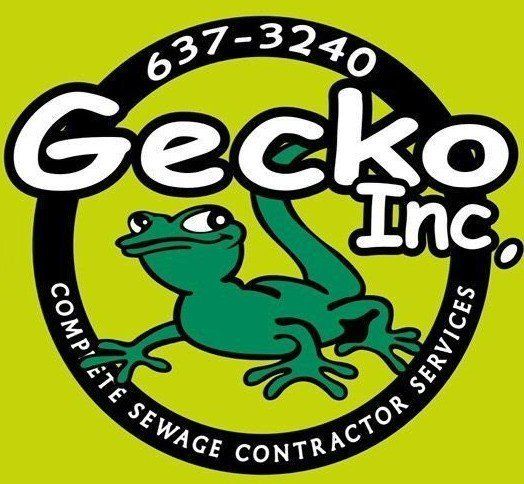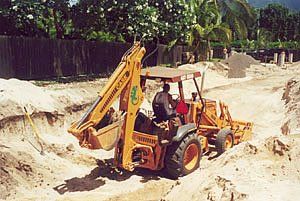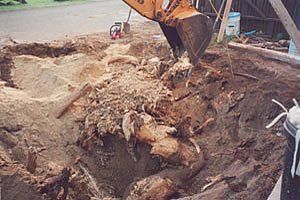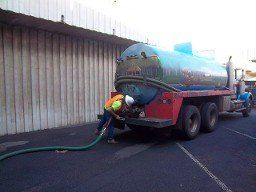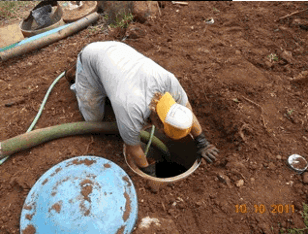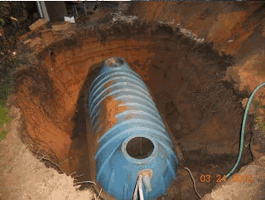Cesspool Users Face Higher Pumping Rates
April 7, 2003 Honolulu Advertiser
By Eloise Aguiar, Advertiser Staff Writer
After years of leniency toward cesspool users, the city has embarked on a vigorous course of enforcement and fee increases that will reduce city losses on pumping services, but sharply increase cost for hundreds of O'ahu homeowners.
"We want people to start paying attention to their cesspools to avoid excessive pumping and to get rid of the ones that are failing," said Frank Doyle, acting director of the city Department of Environmental Services. For years the city has undercharged residents and didn't enforce an ordinance that required owners to maintain their systems, Doyle said.
The new fees, the first of which will first go into effect July 1, will be a burden, he said, "but at the same time for a number of years now they haven't seen the true cost."
He acknowledged that the city is losing money on its pumping operation, but declined to say how much. Doyle said the changes are being made to bring charges more in line with the cost of the pumping service, to prevent public health hazards caused by failing or inadequate cesspools and because a city ordinance requires it.
The changes could cost thousands of dollars for homeowners who need to upgrade cesspool systems and could add hundreds or thousands of dollars annually to pumping fees that will jump from $33.65 a month now to $132.90 per pump next year. Numerous complaints to the Department of Environmental Services, neighborhood board members and the City Council say the change in pumping service will financially burden homeowners and those on fixed incomes.
Of the 300,000 housing units on O'ahu, cesspools are used in about 3,000 to 4,000 homes. They are mostly in low-lying rural areas with small populations, where it isn't cost-effective to build a sewage treatment plant, or in areas such as 'Aiea Heights where it's difficult to place sewer lines because of the geography.
Some cesspool owners pump once a year, others much more frequently. James Fukuda, a Kahalu'u cesspool owner, must pump up to four times a month, especially when it rains. He's on a monthly contract and pays $33.65. But when the monthly contract option is eliminated beginning July 1, 2004, that same service - four pumps a month - will cost him $531 a month.
Fukuda said the new policy will result in more pollution as people solve the problem by diverting wastewater into streams and backyards. "They're forced to do it (now) because they can't afford to pay the pumping fees," said Fukuda, who is trying to improve his system. "To me the city is going to make things worse. They should put in the new sewer line."
A low-pressure pump system at each home, which would hook into the city's sewer system and end cesspool use, was proposed for Kahalu'u in 1998. Many residents opposed it - they questioned the pumps reliability, maintenance costs and inconvenience of having a pump on their property - so the city backed off. The city and Hawai'i Reserves Inc. are now installing a similar system in La'ie.
Fukuda said he supported the new sewer line in 1998 because he is in a low area and when it rains, all the low-lying cesspools back up and flow onto Kamehameha Highway and into the ocean.
City Councilman Gary Okino, 8th District (Pearl City-Waipi'o-Shafter), who represents 'Aiea Heights, said he thinks the city wants to get out of the pumping business because it's costing too much money.
"They ramped up the (cost) numbers so people would use the private sector," Okino said, adding that the rest of the taxpayers have been subsidizing the lower rates.
The changes apply to all cesspool owners, but the city has sent notices outlining the new fees and other changes to the 620 cesspool owners who use the city's pumping service. According to the city letter, beginning May 1 cesspool owners face termination of their service if they do not maintain their systems in a safe, serviceable condition. The letter also says the city can require corrective action, including repairing or replacing a cesspool with a septic tank, which could cost about $10,000.
Doyle said only about 30 or 40 cesspools fall into the worst category. Any owner whose city service is terminated would have to hire a private company, where charges run about $125 a pump. But Fukuda thinks the number of failing cesspools is higher and people are diverting water to avoid pumping fees. "You just have to walk along the stream and you can see the pipes coming from the houses," he said.
MaryAnne Long, Ko'olauloa Neighborhood Board chairwoman, said people complained about the price increase at a recent meeting. Big families said they are pumping once a week, and the city hasn't offered any solutions, Long said.
"The city has to do something to minimize the impact for those people," she said. The financial burden could be higher if residents replace their present system with a septic tank and the city then decided to bring sewer lines to the community as it is doing in La'ie and plans to do in Kahalu'u in 2008.
Hooking up to the city sewer system is not an option - no matter how reliable your septic tank may be, said 67 year-old Diana Hoppe, of La'ie. La'ie hookups to the city sewer lines where estimated at $3,500 to $6,000, plus a monthly sewer charge.
Hoppe, a retiree living on a fixed income, said hooking up to the city system would be a financial burden and she and about 30 others opposed the project that forces people with working septic tanks to switch over.
"To pay when you don't want it is thievery," Hoppe said. "I just can't see paying for something I don't need."
Cesspool Users Face Higher Pumping Rates
Government agencies in Hawaii are making progress in meeting an April 2005 federal deadline for closing large-capacity cesspools at beach parks, schools and other public facilities. The U.S. Environmental Protection Agency ban on cesspools receiving untreated sewage from 20 or more people per day or daily flows exceeding 1,000 gallons is intended to protect drinking water and the near shore ocean.
The EPA estimates there are 500 such cesspools in Hawaii, mostly owned by the counties, the state or the federal government. But the ban also affects some restaurants, hotels, office complexes and former plantation neighbors. "I think it's going to be a huge expense for the public sector," said Harold Yee, of the Health Department Wastewater Branch. "The number for the Big Island alone is close to 100 (sites)."
Hawaii County expects to spend $5 million to $6 million meeting the EPA deadline to close cesspools at more than 80 parks, gyms and community centers, and install alternative sewer systems, said Pay Engelhard, Parks and Recreation director. In Honolulu, the city will spend close to $4 million over three years to convert cesspools at 16 beach parks, including Hale'iwa, Nanakuli, Waimanalo and Sandy Beach. More than half are either in the design or construction phase or have been completed, said city spokeswoman Carol Costa.
Cesspools are covered pits that receive piped sewage. The solids settle to the bottom while the effluent passes into the surrounding soil. The EPA ban is meant to eliminate the potential for effluent to seep into groundwater or into swimming areas at beach parks.
Proper closure must be done under federal and state guidelines. The cost of closing and replacing large-capacity cesspools depends on the situation and the proximity to municipal sewer systems, Yee said. Alternatives include hooking up to available sewer laterals, installing a septic system or wastewater package plant to treat the sewage before disposal into the ground.
Low-interest loans from a state revolving fund are available to the counties, but no aid is available for private owners. Fines for failing to meet the deadline could be as high as $27,500 per day per violation, said Dean Higuchi, public affairs officer for the EPA in Hawaii.
"It makes sense now to use your money to fix up or close your cesspool and hook up an alternative (rather) than to be fined," he said.
The EPA regulations do not apply to smaller cesspools, such as those serving single-family households. For information call the EPA's Shannon FitzGerald toll-free at (866) 372-9378.
Learn more about recent events involving septic systems and services
by contacting Gecko Enterprises now at (808) 637-3240 in Waialua, Hawaii.
